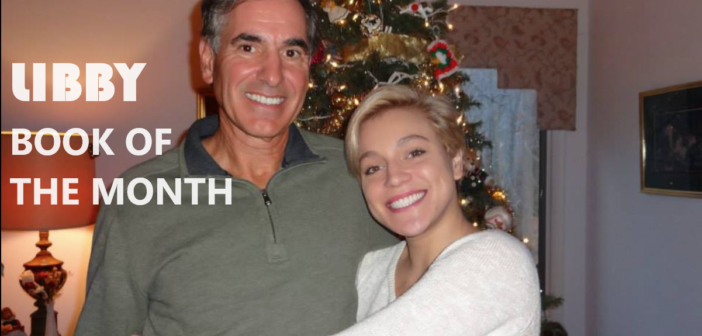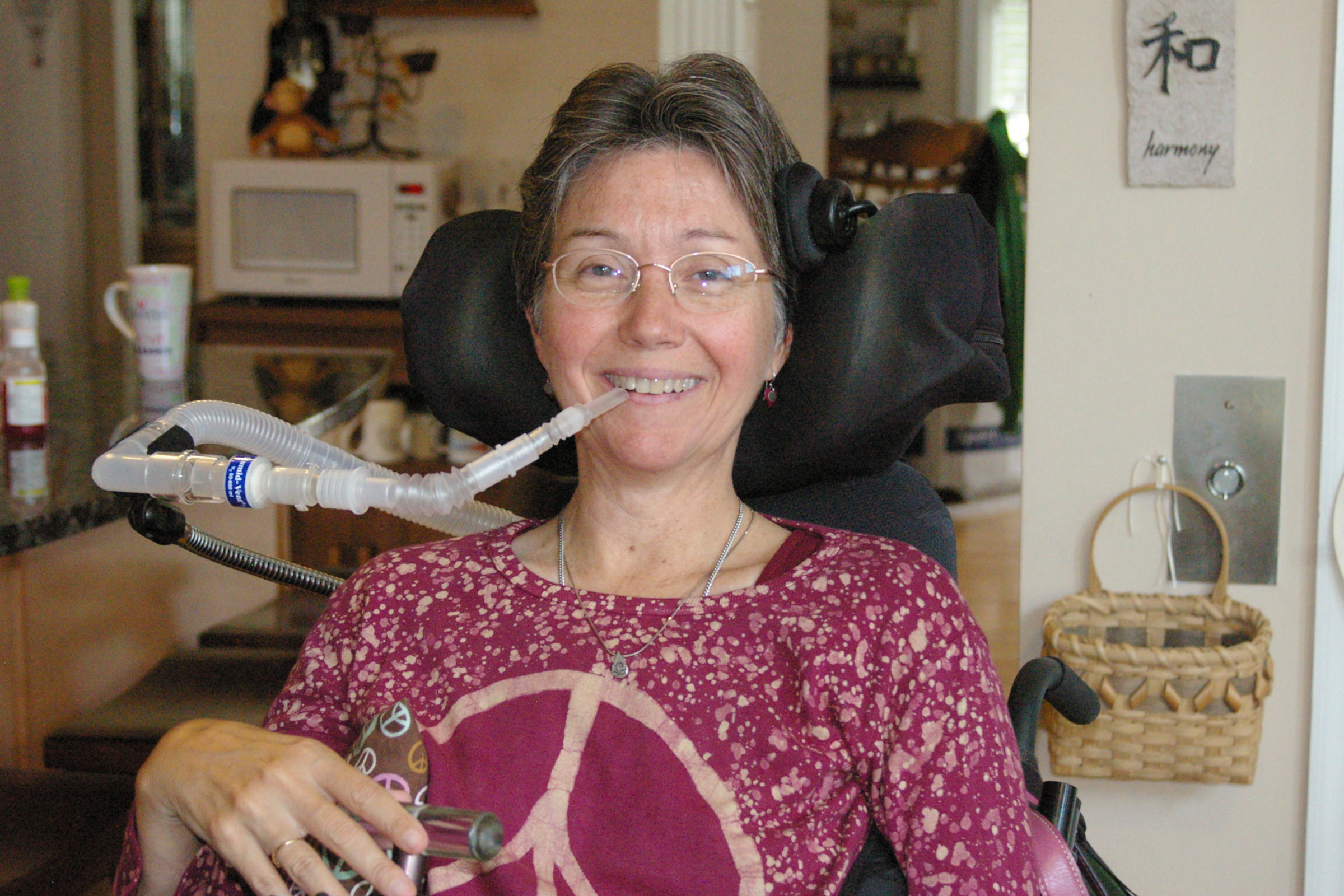February 7, 2024
Mariah Cain, Staff Writer
Interview by Wendy Thompson
Photos: Courtesy Ronald J. Ross
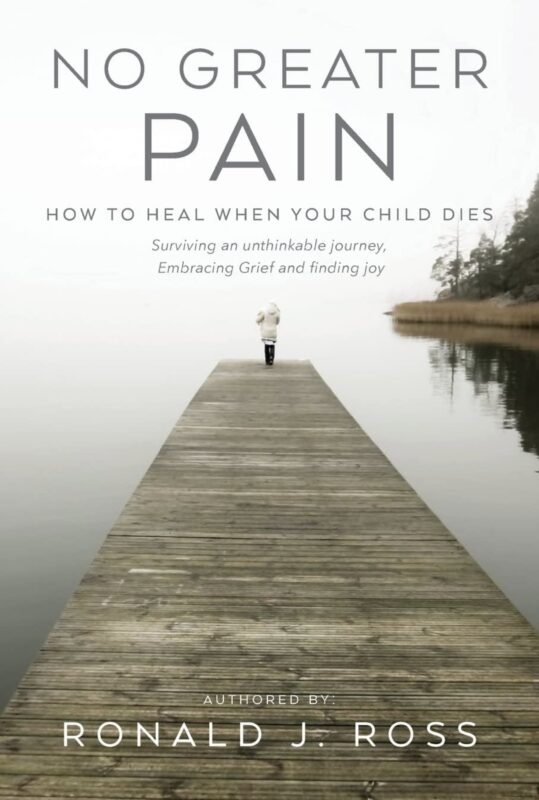
The DC Spotlight debuted its new self-published book section in January 2024 to celebrate the “liberated authors with liberated books,” thus the section Libby Books was created. We chose to debut this section with a courageous book along with a powerful video interview with the author Ronald J. Ross. DC Spotlight’s Editor-in-Chief Wendy Thompson sat down with author Ron to discuss his new memoir: “No Greater Pain: How to heal when your child dies. Surviving an unthinkable journey, embracing grief and finding joy.” The book shares a poignant look into a bereaved parent’s reality and journey after losing his daughter, Amanda, tragically. The book gives readers a glimpse into a father’s worst fears, his tumultuous bout with grief and his reflections on overcoming tremendous loss and pain.
WENDY THOMPSON: I’m Wendy Thompson and today the DC Spotlight talks to author Ron Ross about a sensitive topic: How do you deal with the grief when you lose a child? Ron has written a powerful memoir titled “No Greater Pain: How to heal when your child dies.” Welcome to the DC Spotlight, Ron.
RON ROSS: Thank you, Wendy. I’m glad to be here.
WENDY THOMPSON: So first, let me ask you a little bit about your book. This book has such a powerful testimony on grief, before we get into the book, let’s get some background into your life. So you’re a father? How many kids do you have?
RON ROSS: I have six children. Three boys and three girls. We have a blended family and my daughter is in heaven, of course, and I have seven grandchildren.
WENDY THOMPSON: OK, are you working?
RON ROSS: I’m kind of retired. I worked 31 years in the government, in the intelligence community and I retired now probably ten years ago.
WENDY THOMPSON: So, let’s just dive into the book. The book that you’ve written, can you tell me the title again? And give me a little bit about why you wrote that book and tell me a little bit about your daughter, Amanda.
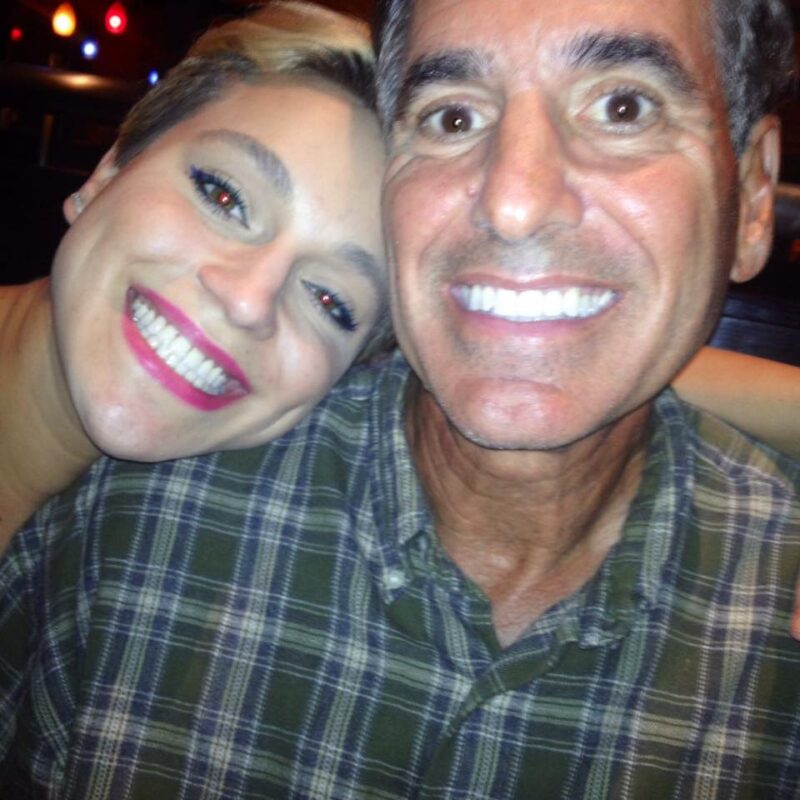
RON ROSS: OK, well let me show you the book. The book is titled “No Greater Pain: How to heal when your child dies. Surviving an unthinkable journey, Embracing grief and finding joy.” I think that the title and subtitle kind of explain everything that’s in the book. My daughter passed two years ago. She was 34 years old, and she had a three-year-old now five-year-old daughter. She was living life happily in South Carolina, when I heard that she tragically died, unexpectedly. So I decided to write this book to survive my grief. I started journaling daily, and I turned the journal into a memoir and I turned the memoir into a book, because I wanted to help people that have lost their child understand the difficult journey that’s ahead and what they experience is normal. Because there’s many emotions tied to grieving when you lose a child. There’s probably 150 different types of emotions, and I think I might have gone through a lot of those. So, I wanted to explain my journey of grief, express all of the emotions that I went through, and some were very severe. I wanted to show reflections back throughout the book to show that you can heal in time. It takes a long time to climb this mountain, and there’s a lot of expectations and things that are unexpected during a time like this. So, I wanted to help bereaved parents understand the journey and see what they’re going through so that they don’t feel that they are going crazy and help non-bereaved parents know what to expect when they meet someone who’s lost a child.
WENDY THOMPSON: So, before we even dive into the book, because this book, like I said, is so powerful, it’s just raw emotions about what you go through everyday. Let’s give Amanda her 15 minutes. Can you just tell me what type of child was she? 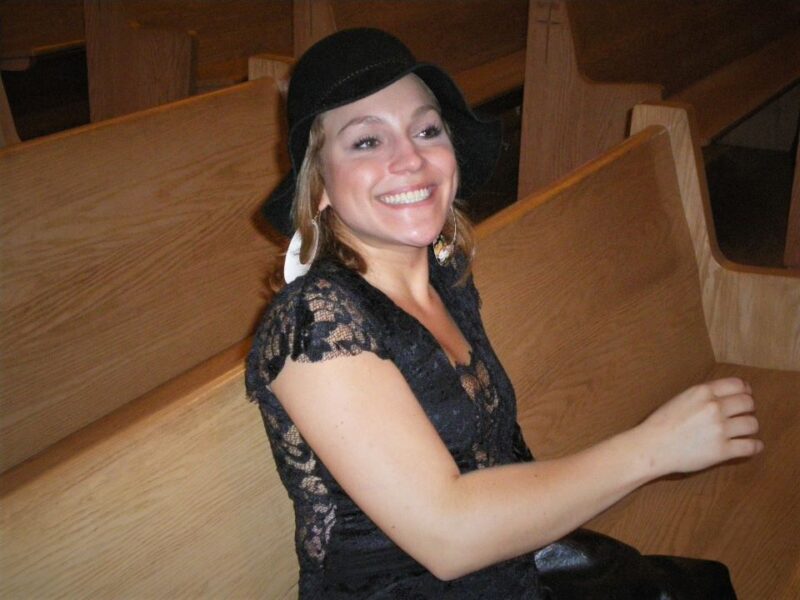
RON ROSS: She was a very playful and happy child. She loved people. She was always laughing. She was full of joy. She always cared, even at an early age, about other people and their feelings and all through her early adult life. She’s always cared and been so sympathetic toward people who were less fortunate.
WENDY THOMPSON: Yes, there’s this point in the book where you talk about the homeless person that she met. Can you tell that story?
RON ROSS: Yes, she was 30 years old at the time, and she was walking in a park in Maryland, and she came across a girl that was about 21 years old. She was crying sitting on the bench and my daughter, Amanda, went up to her and asked what was wrong. The young lady said that her parents had kicked her out of the house and that she was homeless and that she had been out of the home for a night or two. So my daughter took her home to her apartment, and the girl was very hungry and thirsty. So she gave her some food and let her take a shower and gave her some clothes to wear. She gave her some money that she had. She took her to a homeless shelter and she ensured that she could get into the homeless shelter and got her registered there. She also took her to a soup kitchen where they provide meals daily for dinner. She set her up and had her go on her way. That’s the kind of daughter I had. She was always trying to help other people and always trying to care for people who were less fortunate. She had a heart of gold and it’s just been a very difficult journey for me knowing that she’s not going to be here.
WENDY THOMPSON: Yes. So, can you tell me, I know this is difficult because losing someone is very hard, I’ve experienced it myself, recently, and there’s nothing like losing someone you love. But can you tell me, what was it like the day your wife told you your daughter was gone? You don’t have to go through the whole experience, but from that day and then the following days, how did your life change?
RON ROSS: I remember driving to go to the grocery store, and I received a phone call from my wife, and she said, “Come home! Come home immediately!” And I said, “What’s wrong?” and she said, “No, just come home. Turn around and come home.” I said, “Is someone hurt? Did something happen?” and she said, “Please, just please come home.” So, she wouldn’t tell me on the phone, and I was about a mile or two away, but it seemed like an eternity for me to get home. When I walked in the door, I saw my wife who was completely distraught and crying emotionally, so I knew, I was almost afraid to ask. She said, “Amanda is gone.”
WENDY THOMPSON: Take your time. It’s OK.
RON ROSS: So, at that moment, my world turned upside down. I actually think that trauma and shock set in. I just fell to my knees and could not control the tears for hours and at that point, I knew that my life was changed forever, because, I mean, I sat there and said, “What do you mean she’s gone? Where did she go? What do you mean she’s gone?” And then my wife said, “She passed.” And it’s just a memory that’s etched in my mind forever and unfortunately, you just have to move forward with that memory. It’s just something that will never change. My life turned upside down. I knew that my life would be different from that day forward. I knew that I was changed immediately when I heard that my daughter had passed. It was just crushing and the intense pain, emotional pain, and physical pain was just something that I hope no one — it’s just hard to explain the depth of the grief at that moment and the shock.
WENDY THOMPSON: So, you said that the death of a child brings a parent to their knees.
RON ROSS: Yes.
WENDY THOMPSON: And you said every day, especially in the morning, is the worst time. Can you tell what it’s been like, especially in the mornings, every day the grief, and how you deal with that?
RON ROSS: Well, I look back at that, and I would have to confess this, that the first 90 days the tears flowed every day. Every morning and every night, my body shook because of the trauma. It was four months before I could utter the words that my daughter had passed. But every morning you wake up and feel joy for just a moment, then you realize that it wasn’t a nightmare…that my daughter had passed. So you go into a spiral of sorts.
WENDY THOMPSON: Is that when you feel like you’re spinning?
RON ROSS: You’re spinning, you’re just in a fog. The trauma, I honestly have done a lot of research on the brain when there’s trauma to someone’s life like this and basically, you feel so disoriented, confused, total loss of energy, complete exhaustion, shaking every night, and really there were sleepless nights for probably 90 days. You’re exhausted and you just wish that the pain would end, and it doesn’t. It just takes time. It takes months and sometimes much longer for people, for a parent that goes through something like this, because you never think that it’ll happen to you. And when it does, it’s just excruciating pain that you’ve never felt before.
WENDY THOMPSON: In the book, you said that there are a lot of experiences that you go through like brain fog. Like wandering from room to room just staring out into nothing and being forgetful and even not remembering what day it is.
RON ROSS: Yes.
WENDY THOMPSON: I know that I can even attest to that, because I’m going through some of the same things, having lost someone in my life too. So, how are you doing as far as support? I know you were divorced from Amanda’s mother, and you have your wife now, how are they dealing with it? How are you handling the support from your family?
RON ROSS: I think my wife provides support that saved me in so many ways. She’s so patient and understanding and consoling. She actually joined Compassionate Friends for Step-Parents to better understand how to deal with the sadness. She saw me with the sadness for a good year, every day, as much as I tried to put on a strong front, she saw me at my weakest moments, daily. But I received so much support from her, and my step-children were just wonderful, compassionate, understanding, and very generous. I had to try to be strong for my daughter, my son, as they were going through quite a bit also. But the weight of grief, it just does bring you to your knees. The strongest men and the strongest women, their life changes, and it just overwhelmed me with the thought that I would never be able to see my daughter again. One of the things that I grabbed onto was just believing that I would see my daughter again at some point.
WENDY THOMPSON: Yes, you mentioned, in heaven?
RON ROSS: Yes, I’ve read quite a few books on heaven. “Imagining Heaven” by John Burke is a very good book. It basically describes 100 different people that died or flatlined and then came back, they weren’t just in a coma. They flatlined, their heart stopped, and they came back with some incredible stories that were consistent. And it really made me believe more that there is something more after life here on Earth. So, that gave me the hope, and I continue to think that way, that I’ll see Amanda again. I think many parents feel that way too.
WENDY THOMPSON: Yes, many do. How did it affect your faith? Did it shake your faith? Did it strengthen you? Because it can go either way, some people they lose faith, and other people are strengthened.
RON ROSS: I would say it went both ways. I lost faith. I was very angry inside. How could this happen to me? I guess there was quite a bit of self-pity, which isn’t a very healthy thing. Why would this happen to me? To my daughter, who was just enjoying life and just starting a life with her three-year-old girl. I did lose faith, but I turned to the church. I went to my pastor. I gave him a copy of my book, and he mentioned it in his service. And I just prayed, honestly, I prayed to just get past the pain and to try to heal, because that’s all you just wish for initially with the trauma. You just want to have the pain relieved, because it’s just so debilitating at first, physically and mentally. You just lose control. I’ve had, as hard as I hate to admit this, several public meltdowns. Just tearing up uncontrollably in front of people, just triggered by memories, by the stress of it all. It was just difficult to maintain, you know, my composure.
WENDY THOMPSON: Yes, it’s hard. Especially sometimes, I know from personal experience, that sometimes you can go into a grocery store and have to leave, because it just overwhelms you. The grief, it just overwhelms you.
RON ROSS: For all of the bereaved parents out there, the grief, there’s really no time limit. I think that everyone has to experience and do what’s best for them. There’s a lot of times where you don’t have the energy to go to family events or activities. Of course, birthdays, anniversaries, and holidays are so difficult, and sometimes the second or third Christmas or birthday is harder than the first.
WENDY THOMPSON: Yeah.
RON ROSS: During that first year, you’re really kind of in a fog and you’re still traumatized, really for 12 months. Then you learn to accept the fact that your child is gone, and it really kind of hits home that you know you’re going to have to live the rest of your life without your child. Whether it’s your child or your spouse or your parents, I mean, it just depends on the person, and your relationship with that person will depend a lot on how long this lasts. But I just know that for me, it’s been two years almost three months — and I’m just at the point now — it’s really the first time that I’ve talked about this. And I really didn’t know how this would all go, but I couldn’t have done this a year ago.
WENDY THOMPSON: Yes.
RON ROSS: You get resilient and you know that your child wants you to live a happy life and of course, they don’t want you to be sad.
WENDY THOMPSON: That’s easier said than done. The platitudes… I really applaud friends and family for coming and making their statements, and you know they hug you and say, “She would want you to move on with your life,” and things like that. Or in my case, “He would want you to move on with your life,” but that’s so easy to say, but so hard to live.
RON ROSS: So true, Wendy. It’s so true, because grief is a lonely thing.
WENDY THOMPSON: Yes.
RON ROSS: Because all the friends and family can help you and support you, but at the end of the day, it comes back. It’s just a lonely thing, because you have to realize that it’s just you dealing with your own grief and your sadness. I will tell you that grief, in my opinion, doesn’t end. You carry it forward with you. You just have to learn to balance happiness and joy knowing that you’re still sad inside, and that’s just the love that you have. That’s the love that I have for Amanda. I think every bereaved parent will carry their child on their shoulders in memory and strive towards those positive memories. There’s really a risk at complicated prolonged grief where you go into a deep depression and for the most part, I think I had complicated grief. I had some prolonged grief. I think I avoided deep-seated depression. You have to try to take care of your health and self. You have to do things that — many things listed in the book. I explained in the book what I went through, what I did to get past the difficult days, and a lot of it is really just sometimes being alone and being able as society and days build, as the grief goes by. I just feel that for my case, I just had to relieve it. I always felt better after a good cry. I really did, because I know that my daughter’s looking down and seeing my pain, but also she sees the love. So, you know, there’s an understanding that grief is love, and love really does kind of conquer everything. In the end, you start healing and feeling better in the sense that the intensity and the frequency of the emotional episodes, they lessen with time.
WENDY THOMPSON: Yes.
RON ROSS: They’re not as intense with time, but they’re still there. I think they will always be there, and then you kind of grow from that. It’s kind of like, I was reading a book that described grief in this way: Grief is like a circle and there’s a box around the circle. The circle never shrinks, which is grief, but the box around the circle expands, because as you grow and learn and become more resilient, you start to build a new life, and the box gets bigger. The circle stays the same. The grief is still there, but you start growing into a person that you want to be and a life that is a different normal now. It’s not normal how it was before. You can never go back to who you were before.
WENDY THOMPSON: Yes.
RON ROSS: With the loss of my daughter, I’ve learned to really appreciate many things. I feel real sadness for people who are less fortunate or going through the same things, because you have that immediate connection with people that have lost a child, especially for a parent or a spouse. I imagine losing a spouse would be undeniably awful, and I wouldn’t wish that on anybody. And the same with parents, honestly. I lost my parents many years ago. One year after the other, they were both 77 years old, and I grieved. I grieved especially more when my mother died, next, because then you’re alone. But you realize that they lived a long life, so you lose the past, but you have those memories. You realize that they lived a long life, and you learn to accept that. And if you lose a spouse or a significant other, that’s more traumatizing, because you lose the present, you lose all that. But then when you lose a child, you lose the future. You lose all those future dreams and you lose the thought that your child is missing out on all of those things that are so good in life, like raising her daughter.
WENDY THOMPSON: Watching her friends grow up. Watching them have babies and get married.
RON ROSS: All that and even generations. Families change. It’s altering events.
WENDY THOMPSON: Yes, so how will you handle the holidays? Because for me, the holidays are brutal. It’s just brutal. Have you created new traditions? Or how do you remember her around the holidays?
RON ROSS: I always remember Amanda around the holidays and actually when we see her daughter, Ellie, we always make sure that she remembers her mom. We have pictures of her mom, and we show videos of her mom. The first holidays were brutal, and I really couldn’t attend some things and I just really kind of embarrassingly fell apart in front of my family that first Christmas. It was only a couple of months from the death of Amanda. She died in September, and of course, Christmas was right around the corner. Her birthday was right through November, so those were really challenging times. The second time around, I suppressed a lot of the sadness. I wanted to try and enjoy family more. I didn’t want to sadden the events, so you kind of have shadows of sadness, in the sense, that honestly, a bereaved parent will put a mask on. It’s masking. On the outside, you’re enjoying the moment. You’re trying to get through the day, but deep down inside, there’s that sadness and missing for me for Amanda, that you know, I wish she was there. It’s the hardest thing. It’s been two years, and now the holidays are coming up again. So I’m really looking forward to it more. My step-daughter has a little baby, and my son has children, so I just try to look forward and try to enjoy what I have. I’ve learned through all of this that you just have to appreciate what you have, because there’s many people out there who are less fortunate. I have a family; I have children. I remember somebody said that to me, “Ron, you have other children,” and I remember how much that hurt at the time, because that didn’t make the pain go away.
WENDY THOMPSON: Yes.
RON ROSS: I know I have other children, I love them dearly. I love them all the same. But still that was a friend that intended to say something comforting. But your emotions are so magnified through grief that when people say things and do things that aren’t expected, you just learn that they mean well and they’re compassionate. A lot of people just don’t know what to say.
WENDY THOMPSON: Yes.
RON ROSS: There’s a lot of things that I put in my book that will resonate with a mother’s point of view also.
WENDY THOMPSON: Tell me out of all of this — and this has been probably more traumatic than anything that you will ever experience in your life — so, you have to ask the question: Why? Why me? Why my family? Why Amanda? But in the end, once you go through the stages of grief, and you accept that she’s no longer here, you have to look for a deeper meaning. Have you found that? Have you determined why did this happen? Why was I chosen? Why was she chosen? What have I learned from this?
RON ROSS: Boy, that’s a great question, Wendy. It does give you a deeper meaning. I try to live my life now for Amanda. I really try to live my life being more compassionate and giving. You know I work at the local food kitchen. I enjoy helping people who are less fortunate. Judging people — judging anything — is not on the table anymore. I don’t have the energy to judge anybody, because it’s not my right to judge a person. You don’t know what a person is going through, in a lot of ways. I feel that I am more sensitive to so many more things.
WENDY THOMPSON: Yes.
RON ROSS: I can feel so much easier than I did before. I don’t mind showing the emotion, because you just live this life one time. If you keep suppressing everything, I think, in the long run it’s more damaging. I think fathers are strong, and they put up a good front for years and years. I think resentment and anger may creep in, and I think it will take longer to heal. Losing my daughter is kind of like an amputation of the heart. It doesn’t grow back. It’s worse than losing an arm or a leg. It’s just an emotion that stays with you forever.
WENDY THOMPSON: Yes. I feel you more than you know. I’m going through the same thing, and for me it’s been about six years. But like you said, you think the first year is the worst, but I think this year is the worst.
RON ROSS: I’m so sorry.
WENDY THOMPSON: Especially around Christmas time and Thanksgiving. Especially Christmas, it’s horrible. So, you know, that’s particularly why I wanted people to reach out to you and to read your book and to let you tell your story, because I believe even with me, for my loved one, just listening to people talk about him, and how they knew him, and their experiences [with him]… That’s another thing that I wanted to mention. You mentioned in the book about keeping videos and keeping audio tapes. I did that. I made a lot of videos and a lot of audio tapes, and it’s so priceless. I can’t begin to tell people to make as many videos and audio tapes of your loved ones, because when they’re gone, that will be the only thing that you hold on to.
RON ROSS: Yes.
WENDY THOMPSON: You agreed with that.
RON ROSS: That is so true. Technology is so good now, because you have those videos. I remember looking at those videos early on, and it was very difficult. It would create a lot of tears, but now I look at the videos, and I smile more often. I just see her how she is, you know. They are precious. They are priceless. Pictures and videos that I’ll be able to show to Amanda’s daughter in the future. And yes, that is something that I would encourage everybody to do. It just takes a while to stabilize. I’ve done a lot of research, and it really takes 2 to 5 years for a parent to become stable, and sometimes it takes a lot longer. So you don’t want to get caught in and stuck in grief. You have to just try to keep moving forward. A friend of mine would say — I would say I’m having a bad day and he would say, “Ron, just keep trying to move forward” and that’s so true, because you can take one step forward and two steps back many times throughout the first few years.
WENDY THOMPSON: Yes, just get up. Just get up out of the bed and just put one foot in front of the other, that’s how I say it.
RON ROSS: Just do what’s best for you, try to take care of your health and your emotional well-being, I think it’s so important. That would be my message, yes.
WENDY THOMPSON: So, where can people pick up your book?
RON ROSS: It’s available on Amazon, that’s the best place to get it. I think it’s also on Barnes and Noble. It may be on Walmart. The easiest place, I think, would be Amazon. I would say, it’s a good book for bereaved parents to understand the journey and what I did to heal. It’s also good for non-bereaved parents to understand what someone goes through when they lose a child or a spouse or any loss. And there’s a place at the end of the book to maybe provide a review of two. I can tell you that out of the 20 or 25 reviews that I have read, it just is such a healing effect for me, because I see people that say, “Oh, I’ve been feeling this. I’m so glad I read your book, because I’ve been through the same thing and I know I’m not going crazy.” And so many people know people who have lost a child or lost a spouse or a significant other, and it just warmed my heart that it’s helped them. That’s all I wanted from my book. And I don’t expect to make profit from my book; that’s not the intent. It’s really just a penny’s profit. I just really want people to get it and read through it and understand that it’s a long journey, but in the end, there’s a lot of light ahead. Where you can live your life in a different way, in a more meaningful way.
WENDY THOMPSON: Well thank you. We have about one minute and I just wanted to thank you and say the book, as I mentioned, is so powerful and so raw and so helpful. For me and for other people it’s going to be such a helpful, healing way to grieve and to learn how to grieve and get through your pain. So We wish you well and we thank you for coming on the DC Spotlight. And I hope your holidays are filled with joy and great memories of your daughter, and we wish you success with your book. Thank you for coming on.
RON ROSS: I hope you have a good holiday, also.
WENDY THOMPSON: Thank you. Thank you. So you have a good holiday.
RON ROSS: I felt privileged and honored that you asked for this interview. I really appreciate it. Thank you very much, Wendy.
WENDY THOMPSON: You’re welcome. You’re welcome and good luck to you and your family.
RON ROSS: Thank you, same to you. Thank you very much.
WENDY THOMPSON: Alright, bye bye.
PURCHASE THE BOOK

Click this link to purchase a copy of “No Greater Pain: How to heal when your child dies. Surviving an unthinkable journey, Embracing grief and finding joy.” by Ron Ross. If you enjoyed reading the book, please leave a review.

